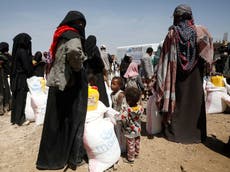Britain’s foreign aid cuts have cost ‘thousands of lives’ and ‘damaged’ country’s reputation
The decision to reduce the overseas aid budget has proved ‘disastrous’ and deadly, according to a new study, reports Tom Ambrose

Thousands of the world’s most vulnerable people have died as a direct consequence of Boris Johnson’s “disastrous” foreign aid cuts, a devastating new report has revealed.
As well as the humanitarian cost of slashing the UK’s overseas aid budget from 0.7 per cent to 0.5 per cent of gross national income (GNI), the cuts have decimated Britain’s “soft power” in countries like war-torn Syria.
An exclusive survey of 1,115 displaced Syrians – 715 internally displaced and 400 refugees living in makeshift camps in Lebanon – by the charity Syria Relief found that 95 per cent were worried about British foreign aid cuts. A further 93 per cent admitted their opinion of the UK had deteriorated as a result.
Some 13.4 million people living in Syria are in need of humanitarian aid, with 90 per cent of the country’s population living below the poverty line, according to the United Nations.
The Conservative government’s decision to cut Britain’s foreign aid budget by £4.5bn – despite its manifesto pledge to retain the 0.7 per cent spend – sparked outrage at the time of the House of Commons vote in July 2021.
Now the deteriorating humanitarian crisis in countries like Syria, as well as Britain’s declining influence in the region, has reignited calls for the cuts to be reversed.
Conservative MP Andrew Mitchell, who served as secretary of state for international development between 2010 and 2012, said “thousands of lives have been lost” because of Boris Johnson’s cuts.
“The disastrous decision to slash our foreign aid budget from 0.7 per cent to 0.5 per cent of GNI has punctured [Britain’s] legacy,” he said.
“It has done untold damage to the UK’s reputation as a superpower soft power, and undermined our global leadership ... those who will bear the brunt of these budget reductions are the world’s most vulnerable people, and nowhere is this more starkly demonstrated than in Syria.
“We know that thousands of lives have been lost as a direct result of the cuts, and many more are at risk due to lower funding for programmes such as water and sanitation.”
“But,” he added, “statistics are faceless and nameless. Behind the facts and figures are real people whose stories need to be told.”
One of those real people is Abdulraheem, a father-of-11 originally from Raqqa in Syria, who has been living in a refugee camp in Lebanon since 2014.
“The reduction of aid budgets by donors is going to affect us greatly. Winter is the worst time this could happen,” he said. “The economic situation here has hit us hard, we can’t collect fuel to heat our tent for winter so we have to collect wood and what we have isn’t enough. Medicine that used to cost us 5,000 lira costs us 100,000 now. It would be cheaper to send someone to Syria to get the medication.”
Syria Relief’s head of advocacy Charles Lawley told The Independent that “cutting aid to some of the most vulnerable people in the world is going to make them even more vulnerable”.
The disastrous decision to slash our foreign aid budget from 0.7 per cent to 0.5 per cent of GNI has punctured [Britain’s] legacy
Britain is also seeing its reputation damaged in Syria. “With almost 19 in 20 displaced Syrians expressing that their opinion of the UK has deteriorated due to the aid budget cuts, it is clear that it has done a lot of harm to Britain’s ability to influence the world in a positive way, not just the people of Syria,” he said.
Preet Kaur Gill, Labour’s shadow cabinet minister for international development said: “This report sets out in clear detail exactly how the Conservatives’ politically motivated decision to abandon their manifesto commitment on aid has a real-world impact.
“In Syria, more than 90 per cent of the population have been plunged into poverty after a decade of death and destruction and so, cutting vital life-saving aid puts thousands of lives in danger.
“These actions demonstrate how Britain is making a shameful retreat from the world stage and erodes our authority at a time when we need the international community to act together.”
Layla Moran, the Liberal Democrats foreign affairs spokesperson, said: “This report provides yet more proof – if it was needed – of the damage caused by the deeply misguided decision to abandon the 0.7 per cent of GNI aid target. The UK Government must restore it urgently.

“Not only does the aid cut mean we are responding to humanitarian crises like this with one hand tied behind our back, but Britain’s place on the world stage is being undermined.”
But a Foreign, Commonwealth and Development Office (FCDO) spokesperson said the government plans to return to spending 0.7 per cent of GNI on “official development assistance”.
They said: “The UK is one of the largest global aid donors and to date has spent over £3.7bn in response to the Syrian crisis. Our aid provides life-saving humanitarian support to millions of Syrians, including emergency food, health and shelter, and supports refugees to remain in countries in the region.”






Join our commenting forum
Join thought-provoking conversations, follow other Independent readers and see their replies
Comments